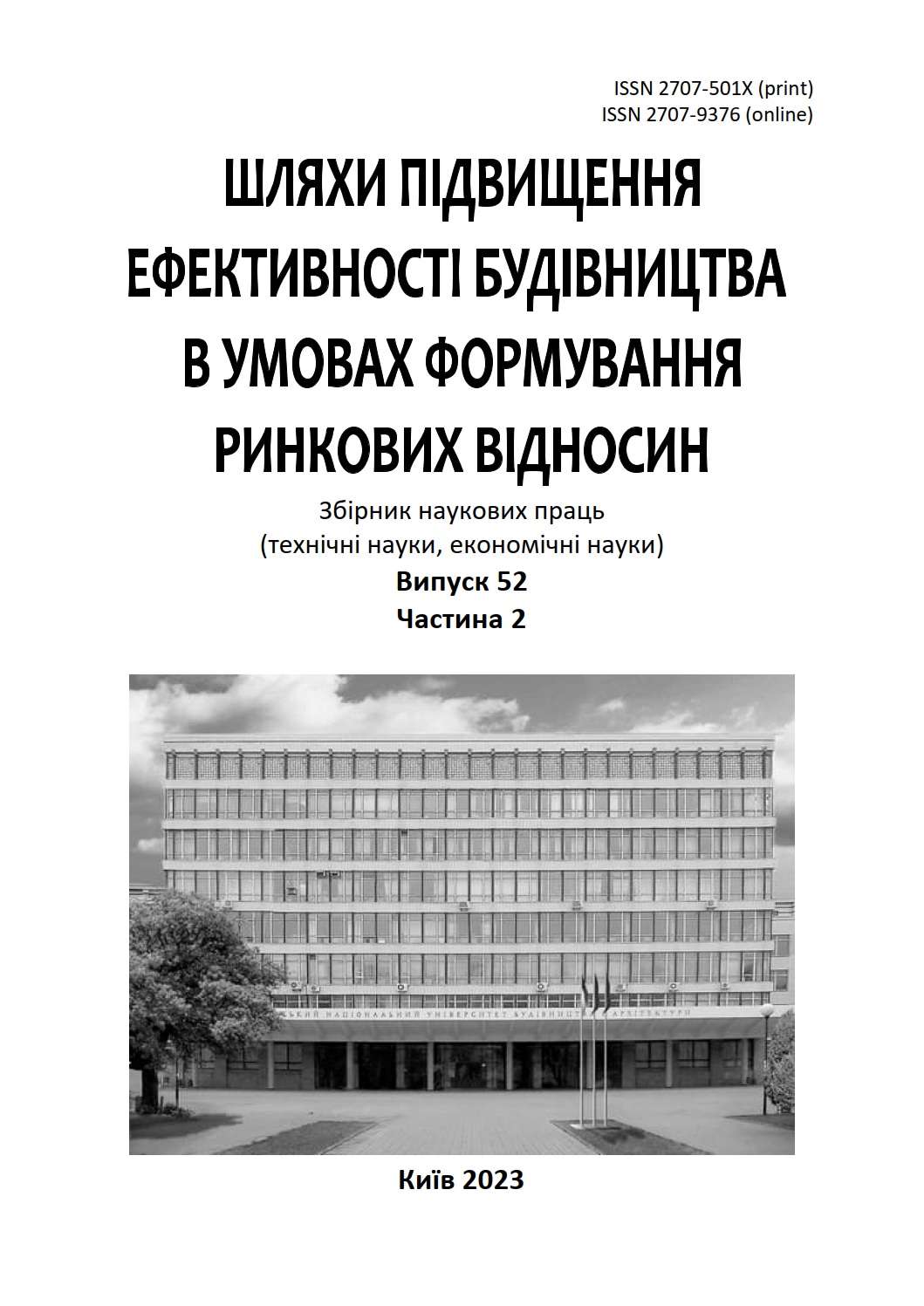International standards and tools for management of innovative projects in construction
DOI:
https://doi.org/10.32347/2707-501x.2023.52(2).250-268Keywords:
international standards, innovative projects, construction, BIM, project management, ISO 21500, digital tools, sustainable development, automation, risk managementAbstract
In the context of globalization and digital transformation of the industry, there is a growing need to integrate generally recognized standards, such as ISO 21500, PMBOK, PRINCE2 and others, which provide a unified approach to project management. These standards define the basic principles of planning, monitoring, control and performance evaluation, which are critically important for the successful implementation of innovative solutions in complex construction projects.
Particular attention is paid to digital management tools based on the use of information technologies, such as BIM, CAD and specialized software for resource planning. The integration of these tools allows you to create a comprehensive information model of the project, which provides accurate visualization, automation of calculations and coordination of actions between various participants in the process. The use of such tools increases the accuracy of risk assessment, optimizes decision-making processes and helps minimize costs and time for completing tasks.
International practice shows that the implementation of innovative approaches in construction requires the adaptation of existing standards to specific market conditions, as well as the development of national recommendations that take into account legal, economic and social aspects. Knowledge management occupies a special place, because the successful implementation of projects depends on the effective exchange of experience, the creation of knowledge bases and the application of modern methods of training specialists.
In this context, analytics and forecasting tools play an important role, providing accurate data for assessing the feasibility of implementing innovations. In particular, machine learning and artificial intelligence technologies open up new opportunities for analyzing large amounts of information and automating decision-making processes. In addition, strategic management focused on sustainable development contributes to increased environmental responsibility and the implementation of energy-efficient solutions.
Thus, international standards and tools for managing innovative projects in construction are an important factor in the development of the industry. Their implementation ensures increased efficiency, integration of advanced technologies and harmonization of management approaches, contributing to the formation of competitive and sustainable construction practices.
References
Abramov, O.V. (2019). "Management of innovations in construction: international standards and practices". Kyiv: Institute of innovative technologies. Рp. 45-68.
Baranov, P.S. (2021). "BIM technologies as a tool for project management in construction". Kharkiv: Architectural heritage. Рp. 112-130.
Vasyliev, K.G. (2020). "Digitalization of construction processes based on international standards". Odesa: Construction. Рp. 88-104.
Gerasimenko, A.M. (2021). "Integration of ISO 21500 into construction project management processes". Lviv: Technologies of modernity. Рp. 73-89.
Dubrova, L.A. (2022). "Environmental responsibility in the context of innovative construction projects". Kyiv: Science and Technology. Рp. 50-66.
Zhukova, O.P. (2020). "Digital platforms for project management in construction". Kharkiv: Innovative development. Рp. 99-115.
Zaitsev, R.I. (2019). "Automation of construction process planning: approaches and tools". Dnipro: Construction technology. Рp. 76-91.
Ivanenko, T.V. (2021). "BIM as a basis for digital management of construction projects". Kyiv: Architecture and digitalization. Рp. 102-118.
Karpenko, I.G. (2022). "International project management standards: adaptation to national conditions". Lviv: Construction economics. Рp. 60-75.
Klymenko, S.M. (2020). "Digital technologies in construction: modern challenges and prospects". Odesa: Construction innovations. Рp. 115-130.
Kolesnikov, D.V. (2019). "Risk modeling in construction projects using digital tools". Kharkiv: Management Science. Рp. 45-63.
Korolchuk, L.O. "PMBOK standards in construction: applied aspects". Poltava: Project management, 2021. — pp. 94-109.
Kryvosheyev, V.G. (2020). "Digital modeling of construction processes: theory and practice". Kyiv: Technological innovations. Рp. 81-96.
Ryzhakova, G.M., Chupryna, Yu.A., Gavrykov, D.O., Borodavko, M.V. (2019). Formation of a construction cluster in the format of state investment target programs. Ways to increase the efficiency of construction in the conditions of the formation of market relations. Vol. 40. Pр. 19-25.
Lazarenko, O.Yu. (2021). "Forecasting tools in construction projects". Lviv: Modern Construction. Рp. 70-86.
Malinovsky, P.S. (2022). "Integration of artificial intelligence into construction processes". Kyiv: Technika i progres. Рp. 108-124.
Nazarenko, T.M. (2020). "Using PRINCE2 standards in construction projects". Odesa: Innovative Technologies. Рp. 54-71.
Pavlenko, Y.P. (2021). "Strategic Management of Innovative Projects in Construction". Kharkiv: Construction Strategy. Рp. 99-114.
Romanenko, V.S. (2020). "Information Models in Construction: Modern Perspectives". Dnipro: Digital Construction. Рp. 65-81.
Sokolov, I.V. (2021). "Evaluation of the Effectiveness of BIM Implementation in Construction Projects". Kyiv: Project Analysis. Рp. 90-105.
Fedorova, Ya., Petrenko, G., Grinenko, I., Ryzhakova, G., Chupryna, Y., & Nikolaeva, M. (2021). Methodological and analytical components and basic functionalities of enterprise management in the modern system of construction development. Management of complex systems development, (47), 130–137.
Shevchenko, N.A. (2022). "Energy saving in construction through innovative technologies". Lviv: Sustainable development. Рp. 112-129.
Zeltser, R.Ia. (2018). Innovatsiini modeli i metody orhanizatsii, upravlinnia i ekonomichnoi otsinky tekhnolohichnykh protsesiv budivelnoho vyrobnytstva: monohrafiia. Kyiv: «MP Lesia». 208 s.
Livinskyi, O.M., Kliuiev, V.V., Savenko, V.I., еt al. (2018). Menedzhment yakosti v budivnytstvi ta vyrobnychi orhanizatsiini systemy: monohrafiia. Kyiv: Tsentr uchbovoi literatury, 230 s.
Reznik, N. еt al. (2022). Systems Thinking to Investigate the Archetype of Globalization. Lecture Notes in Networks and Systemsthis link is disabled, 486, pp. 123–140.
Downloads
Published
How to Cite
Issue
Section
License

This work is licensed under a Creative Commons Attribution 4.0 International License.
Authors who publish with this journal agree to the following terms:
- Authors retain copyright and grant the journal right of first publication with the work simultaneously licensed under a Creative Commons Attribution License that allows others to share the work with an acknowledgement of the work's authorship and initial publication in this journal.
- Authors are able to enter into separate, additional contractual arrangements for the non-exclusive distribution of the journal's published version of the work (e.g., post it to an institutional repository or publish it in a book), with an acknowledgement of its initial publication in this journal.
- Authors are permitted and encouraged to post their work online (e.g., in institutional repositories or on their website) prior to and during the submission process, as it can lead to productive exchanges, as well as earlier and greater citation of published work (See The Effect of Open Access).

